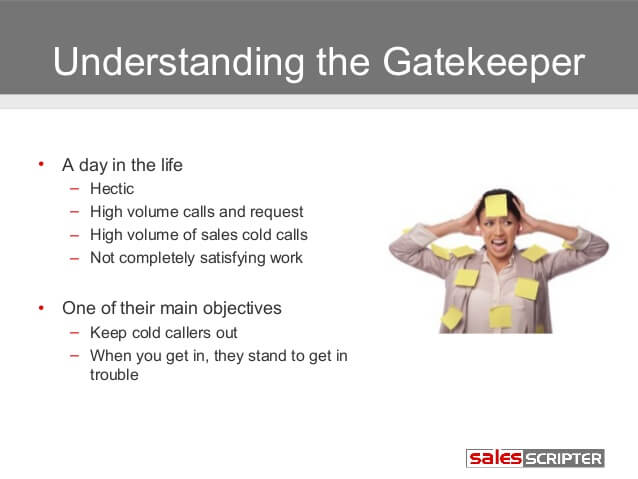What Is A Gatekeeper In Business?
A gatekeeper in business is any person who controls access between one point and another. They decide who gains access to decision-makers.
Gatekeepers can make reaching an important decision-maker directly a formidable challenge. They are usually employed to take calls so they can filter out sales reps and anyone else not deemed to be directly important. Your sales success depends on knowing how to get past the gatekeeper.
What is an example of a gatekeeper?
An example of a gatekeeper in a business setup is the personal secretary or executive assistant who takes calls for their boss and decides which ones get through.
Another is the receptionist or office manager who decides if you will proceed to the office of the person you are prospecting for a sale. Before the receptionist, you may need to get past the security guard, too.
Gatekeepers take many forms and aren’t just limited to sales and marketing. A newspaper editor who decides what stories the newspaper will publish is another example.
In film and television, a casting director decides who gets to play a specific character. If you attend concerts and go clubbing, you should also be familiar with bouncers and the job they do.
Getting Past the Gatekeeper Takes Skill and Persistence
You should never flog a dead horse, as the saying goes.
If you have to approach the decision maker directly, and you’ve been sidelined by the gatekeeper — that avenue of contact won’t work. You will need to find a way past the gatekeeper. One that works.
The irritating part of all this is that the gatekeeper possibly doesn’t understand too much about the business that the decision-maker is involved in. This can be especially annoying when you ‘know’ that the decision-maker would definitely benefit from what you have to offer.
All the gatekeeper knows is that you are selling something, and they have been told to filter out all sales reps. That means you are not going to get anywhere near the inner sanctum if the gatekeeper has anything to do with it.
The gatekeeper’s job isn’t to stop everyone from getting to the decision-maker. Part of their job is to ensure that the right people get seamlessly easy access. If you are not one of the ‘right people,’ then the second part of the gatekeeper’s job kicks in – making sure the wrong people are kept out.
How to Get Past the Gatekeeper?
There are a number of ways that might get you past the gatekeeper. You may need to be a little bit devious and think outside the box, though. Let’s examine seven ways that have the potential to get you past the gatekeeper to access the decision-maker.
1. The gatekeeper is just a person, after all.
You can set yourself up frustration in blocked cold calls and rejected prospecting approaches by thinking you necessarily have to train yourself on how to overcome gatekeeper. Getting through to the decision-maker can be as easy as being courteous in your approach.
The gatekeeper will respond to the same kinds of things that most people do. Befriend the gatekeeper. They will respond to a friendly approach much better than a demanding one.
Here’s a great resource to help you get into the mind of many gatekeepers:

(Source)
Try to establish a rapport with the gatekeeper. Start by using the gatekeeper’s name. Make it personal. Be polite, respectful, and honest, as well as friendly, and you will greatly increase your chances of getting access.
Never forget that the gatekeeper does not have the final say. Their authority does not allow them to absolutely exclude you from getting access to the decision-maker. Polite persistence could pay off. Even after rejection, try sending them an email and setting up a time to call back.
2. You can try going above the gatekeeper, or going below them.
There will be someone superior to the gatekeeper, other than the person you are trying to reach. If you can get through to the person above the gatekeeper, you have a very good chance of getting through to the decision-maker.
The same goes for the person below the gatekeeper. Remember, both of these people do not have it in their job remit to block the ‘wrong people’ from gaining access to the decision-maker. If you can persuade either of them that you really should gain access, there’s a very good chance you will.
3. The one thing that many sales reps don’t usually consider is the possibility that the gatekeeper might go home at the end of the working day before the boss does.
Try calling at a time after the gatekeeper has left. You just might find the decision-maker answering the phone.
Another good reason for doing this is that most people will have likely stopped working at this time. The boss might be impressed that you are obviously still working, just as he/she is.
Your dedication to hard work, or the decision maker’s perception of it at least, might pay off.
A poll of decision-makers has revealed that some 78% of them will sometimes respond favorably to a call they receive, but only if the gatekeeper has already gone home, or isn’t around for whatever reason.
If you know the decision maker is in his/her office, then very early in the morning, or late in the evening is by far the best time to call.
4. Try to contact the decision maker directly through social media.
It is not commonly the gatekeeper’s job to manage the boss’s social media profiles. Try LinkedIn first. Their In-mail feature could get you direct access. You could also try Twitter or Facebook.
LinkedIn is usually the best social media platform to make contact with. It is generally considered to be the most serious, and important decision-makers usually have a LinkedIn profile.
According to the research of Brandon Gaille, at least 48% of all LinkedIn members are in a decision-making role. There are now over 500 million LinkedIn members, which means an awful lot of decision-makers are active on the platform.
5. One very effective, if slightly devious, way of knowing how to get past the gatekeeper is to let them think you actually know the decision maker, and that you are on first-name terms with them.
How can you do this?
Simply say something like. “Hi, it’s Joe Bloggs here. Is Bob in?” This is much better than asking if ‘Mr. Smith is in.’ The gatekeeper may well think that you know ‘Bob’ personally, and catching him/her off-guard like this might well be all it takes to give you the access you need. Be confident, or at least, sound confident!
6. Ask the gatekeeper to help you.
Honesty is often the best approach. When all else fails, try asking if they know of any way they can help you – anything at all. Laying yourself bare like that might just touch a nerve with the gatekeeper, and you might get what you want.
You can also treat a gatekeeper as a resource by immediately acknowledging their role. Be nice and take time to ask about their day so they know you don’t see them as an obstruction to the sale.
7. When you find yourself speaking to a gatekeeper, don’t waste time.
According to Wyzowl, you only have 30 seconds at best to make an impression with the gatekeeper.
How Do You Get Past The Gatekeeper When Cold Calling?
Getting past the gatekeeper on the phone is particularly difficult because they can easily dismiss you or end the call abruptly without feeling bad about it since they cannot see you. You cannot rely on your infectious smile either because they can’t see it.
Try using an assumptive tone, talking as if you know you will be put through to the decision maker. One way of doing this is by saying, ‘thank you’ after telling them who you are and that you would like to talk to the decision maker.
Another slightly devious tactic that works is making the gatekeeper think you know the decision-maker personally. Asking for the decision maker by their first name gives the impression you are already acquainted with them.
Lastly, avoid giving out too much information about why you are calling. The gatekeeper can’t say the decision maker wouldn’t be interested in what you are pitching if they don’t what it is.
Know who you are pitching, and it’s not the gatekeeper.
Answer only the questions you have been asked without giving too much away. Without being rude, cut the small talk and quickly get to why you are calling. If the gatekeeper is busy, they will appreciate you not wasting their time.
How Do You Handle Gatekeeper Objections?
Gatekeeper objections will happen at some point and it’s important to learn how to handle them with grace. When cold calling, in particular, the decision maker may indeed not be available to take your call.
Take the opportunity to lay the groundwork for your next call if you intend to call again. The next time you will not be a total stranger and the gatekeeper may be more inclined to consider your request favorably.
So be kind and professional as you end the call. Keep your cool and avoid getting angry or showing your frustration. If you handle the objection well, the gatekeeper can turn out to be an important ally.
Remember, though, you can reduce the chances of an objection by simply being prepared. Do your research about the decision-maker and the questions the gatekeeper will likely ask you.
And there it is, your cheat sheet for how to get past the gatekeeper and score a call or meeting with the decision-maker. Happy prospecting.
Want to help contribute to future articles? Have data-backed and tactical advice to share? I’d love to hear from you!
We have over 60,000 monthly readers that would love to see it! Contact us and let's discuss your ideas!

